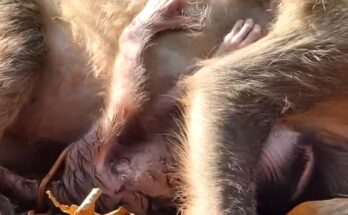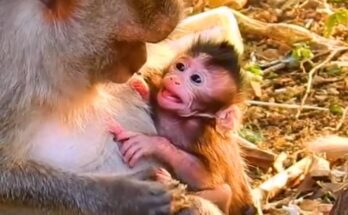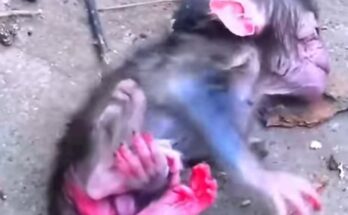The birth of a baby monkey is an extraordinary event in the animal kingdom. For many animals, the early moments of life are filled with vulnerability and dependence on their mothers. However, in the case of certain species of monkeys, the newborn’s journey begins within just 30 minutes of birth. These tiny creatures, with their fragile and undeveloped bodies, already start to embark on a journey that will shape their survival and development.
When a baby monkey is born, it is incredibly dependent on its mother. At birth, the infant is usually covered in soft fur and is physically small, often weighing only a few pounds. The baby’s body is not fully developed, and it lacks the mobility to fend for itself. Yet, within a short span of time, it must begin learning survival skills that will help it thrive in the challenging and sometimes dangerous environment of the jungle or forest. The first few moments of a baby monkey’s life are a critical time when instincts kick in, and the journey of independence begins.
Within 30 minutes of birth, a baby monkey often begins to demonstrate remarkable behavior. While it may still be weak and uncoordinated, the newborn’s first instinct is to cling to its mother. This clinging behavior is essential for the infant’s survival. The mother, in turn, provides warmth, nourishment, and protection. The mother’s immediate response is to lick and groom the baby, which helps stimulate circulation and the development of muscles, strengthening the newborn’s bond with her.
As the baby monkey starts to gain strength, its instinct to cling to the mother grows even more vital. Within minutes, the infant will often grasp onto the mother’s fur with its tiny hands, learning to hold on to her with a tight grip. This is crucial because, in many species of monkeys, the mother spends a lot of time moving through trees and dense vegetation, and the infant must be able to cling to her to avoid falling and to stay close during travel. The newborn’s small body is already equipped with a strong grip reflex, allowing it to hold on tightly even during swift movements or if the mother shifts from one branch to another.
The first hour of the baby monkey’s life is pivotal for its development, both physically and emotionally. The baby begins learning the importance of the mother’s presence, and the instinctual bond forms through physical closeness. Not only does the mother’s warmth offer comfort, but it also ensures the baby’s survival. Some species, like macaques and colobus monkeys, will begin suckling from their mother soon after birth, gaining the essential nutrients needed for growth and immune development.
Beyond survival instincts, the newborn monkey’s rapid progress in its first moments is a testament to how evolutionary pressures have shaped these creatures. In many primate species, being able to start the journey of survival so quickly after birth is vital to avoiding predators and competing for resources. In the wild, the first 30 minutes, hours, and days of life are filled with challenges. If a baby monkey were to fall behind or remain too vulnerable for too long, it could quickly become a target for predators. In the wild, there is little time for delays or immaturity.
As the baby monkey’s journey continues, it will grow more confident, learning to navigate its environment, communicate with others, and socialize within its group. However, the crucial first moments after birth set the foundation for this remarkable journey of survival and independence. Within the span of just 30 minutes, the baby monkey’s instincts to cling, grasp, and seek out nourishment will pave the way for its first steps into the world of the wild, where every moment is a lesson in survival.


